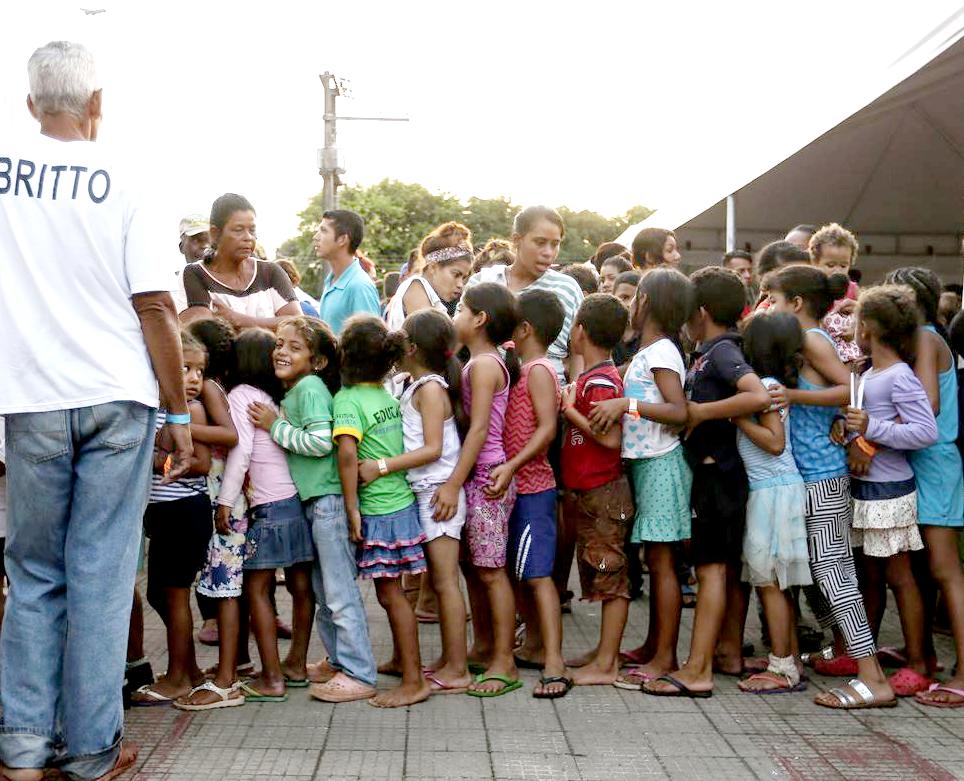
Venezuelan History: After Chavez (2013- )

Figure 1.--This is the impact of Chavismo--hungary children. The photo shows a group of Venezuelan refugee children in Boa Vista, Brazil on the Venezuela border. The city is in Roraima state and like other border towns is cramed with deperate people fleeing the disater that Chavez and Maduro have created in Venezuela. The children are lining up for a food distribution.
|
|
President Chavez died (2013). Vice President Nicolas Maduro seceeded him. A special presidential election was held. Maduro does not have Chavez's charisma, but with a control of most of the country's media and most Chavistas, he had a very narrow victory -- 50.6 percent. It is likely that ballot stuffing provided the margin of victory. Despite sitting on huge reserves the ecomomic decline underchavez has continued. Chavista economic policies have gutted the private economy. The producyive sector was targetted. Government regulationsrequired them to sell their out put for less than than it cost to produce. Needed imports became impossible to obtain. Business owners were forced to shut down. Agricultural production also declined becuse Chavusta poolicies drove the country's best farmers out of farming. He did not shoot them like Stalin, but he did seize their land. Maduro is now experiencung the consequences of these policies. Venezyelanms are starving. Chavez and Maduro expected that the oil income could just pay for everything. Inciompetent management has, however, resulting in falling output. Foreign oil companies were driven out of the country and competent employees of PEDEVESA were replaced by politicall relaible hires who knew nothing about the oil industry. Funds needed to maintain the oil infrastrucure were diverted to socialist projecrs Chavista politicial corruption. The result has been the destructioin of needed infrastructure. In addition oil prices fell. Oil now contributes 95 percen of exports. And because agricultural and other production has suffered. Under Chavez the country was having to use much of its oil income exports to import food and other basics. Under Maduro the Government no longer has the finfs to import nthe needed funds let alone other basics. Veneuyelanms are losing weight and some are actually starving. Brazilian and Colombian officials have met with their Venezuelan counterparts to try to obtain overdue paymnts. And Venezuelan foreign reserves have hemoraged. Maduro has sold off most of the subatantial gold reserves the country once had. Foreign resetves declined nearly 30 percent in 2013 alone.. Petro Caribe dispursements declined to $1.7 billion during the first 9 months of 2013, only a third of 2012 dispurements. Communist Cuba and Nicaragua which Chavez bankrolled are especially hurt by these cutbabcks. Inflation in 2013 is reportedly over 50 percent and the black market exchange rate for dollars is ten time the official rate. Consumers report shortages for even basic neceities such as toilet papt and cooking oil. Often they find empyu shelves in nstores. And if allm of this sonded bad in 2013. The situation has spiraled down much further. The Organization of American States (OAS) reports that crimes against humanity have been committed during his presidency. Under Maduro's administration, more than 9,000 people havenot just been arrested, but executed for 'resistance to authority'. Some 4 million Venezuelans have been forced to flee the country and the number is growing. The Venezuealan Congress has voted Juan Guaidó as interim president. Even so, in the face of massive demonstrations, President Maduro was sworn in for a nother 6-year term ( January 2019). The president of the National Assembly, Juan Guaidó, was declared the interim president by that body (January 2019). Venezuela's crude oil production now stands at its lowest level in more than 50 years. Output averaged only 1.4 million barrels (May 2019). Inflation has escalated from high to hyperinflation. The inflation rate reached 275 percent (2016), but then 860 percent (2017), 130,000 percent (2018), and it looks like the 2019 results will be even higher. And of course the country's poor are the ones most affected by this, the very prople Chavez and Muaduro say they were helping.
CIH

Navigate the Children in History Website:
[Return to the Main Venezuelan history page]
[Return to the Main Venezuelan page]
[Return to the Main South American history page]
[Return to the Main Latin American history page]
[Return to the Main Latin American page]
[Introduction]
[Biographies]
[Chronology]
[Clothing]
[Disease and Health]
[Economics]
[Environmental issues]
[Geography]
[History]
[Human Nature]
[Law]
[Nationalism]
[Presidents]
[Religion]
[Royalty]
[Science]
[Social Class]
[Bibliographies]
[Contributions]
[FAQs]
[Glossaries]
[Images]
[Links]
[Registration]
[Tools]
[Children in History Home]
Created: 12:38 PM 11/4/2019
Last updated: 12:38 PM 11/4/2019



